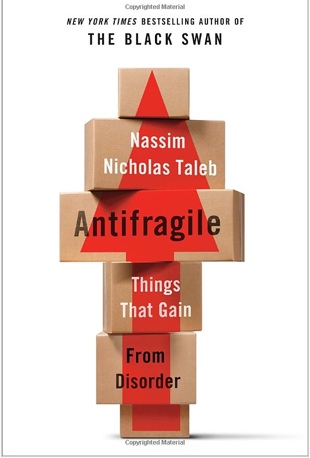Are You Antifragile?
 Tuesday, March 19, 2013 at 11:41AM
Tuesday, March 19, 2013 at 11:41AM From the Guardian's recent review:
The core idea behind this book is simple and quite enticing. Nassim Nicholas Taleb divides the world and all that's in it (people, things, institutions, ways of life) into three categories: the fragile, the robust and the antifragile. You are fragile if you avoid disorder and disruption for fear of the mess they might make of your life: you think you are keeping safe, but really you are making yourself vulnerable to the shock that will tear everything apart. You are robust if you can stand up to shocks without flinching and without changing who you are. But you are antifragile if shocks and disruptions make you stronger and more creative, better able to adapt to each new challenge you face. Taleb thinks we should all try to be antifragile.
Here's the video from RSA. it's dense. Really dense. I reccommend you just watch the short talk and not the economic panel after, unless of course, you are interested in economic systems. I've just ordered this book, and will give you a review later, but for now, I'll share a few ideas from the review that caught my eye. While the author is speaking as a philosopher, and looking at this idea as it applies to things like the bank and financial meltdown, there is plenty to think about on a personal/interpersonal level, too. Playing it safe if a really seductive idea, and a part of being an artist that keeps us locked in and locked up, imprisoned sometimes by our own success. It's a difficult tightrope -- keeping things fresh and, yet, staying intune with our "market," our hard-won and long-to-discover style of work.

From the NYTimes review: In Mr. Taleb’s view, “We have been fragilizing the economy, our health, political life, education, almost everything” by “suppressing randomness and volatility,” much the way that “systematically preventing forest fires from taking place ‘to be safe’ makes the big one much worse.” In fact, he says, top-down efforts to eliminate volatility (whether in the form of “neurotically overprotective parents” or the former Fed chairman Alan Greenspan’s trying to smooth out economic fluctuations by injecting cheap money into the system) end up making things more fragile, not less. Overtreatment of illness or physical problems, he suggests, can lead to medical error, much the way that American support of dictatorial regimes “for the sake of stability” abroad can lead to “chaos after a revolution.”
 books in
books in  Creativity and other big ideas
Creativity and other big ideas 





Reader Comments